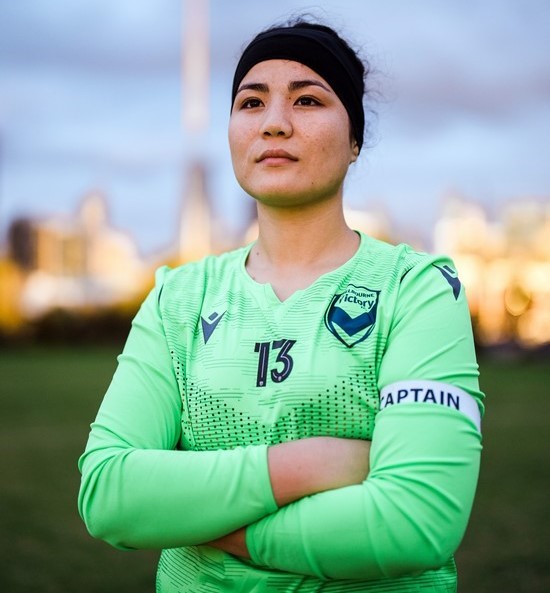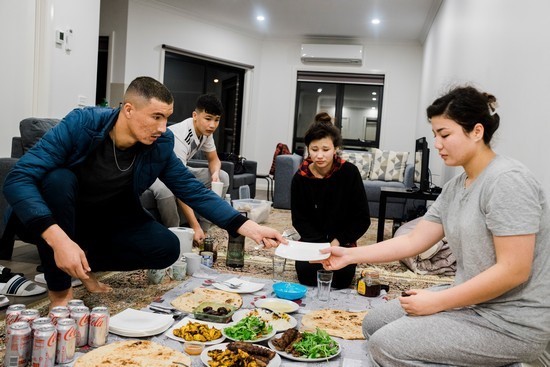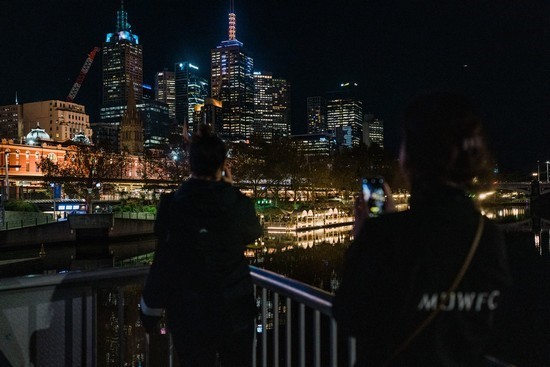When
her new life in Australia becomes too overwhelming, Fati, the goalkeeper for
the Afghanistan national women’s football team, heads to the beach in the
nighttime.
اضافة اعلان
She walks along the shoreline
of Port Phillip Bay, where the skyline of Melbourne glows in the distance. She
shines a flashlight on the colorful fish darting around the shallow water. And
listening to the gentle lapping waves, she takes a deep breath and exhales.
There in the darkness
and solitude, it is Fati’s time to reflect. And to mourn.
“I try hard to relax
and be calm, but I always end up thinking about all the things that have
happened to me and all the things I’ve lost,” she said. “I see that the water
is endless, like my problems are endless.”
About 16 months have
gone by since Fati and her teammates on the national team risked their lives to
escape Afghanistan after the Taliban took over the country. After the New York Times
featured Fati in an article in late summer, she was offered paid speaking
engagements, including one opportunity to speak at a law school graduation in
California in 2023.
“I try not to be negative, but if you want me to tell the truth, I am losing my hope that my family will get a visa.”
There is also a chance
that her story will be turned into a dramatic film after more than a half-dozen
people showed interest in buying the TV and film rights.
“Sometimes I feel,
like, so strong, and I want to keep sharing my story and motivating other
people,” she said. “I’m making a difference, I hope.”
Far-away familyBut none of that can
magically heal her body and mind after running for her life from the Taliban
and then having no choice but to leave her parents and youngest sister behind.
Fati and most of her
teammates on the national football squad were forced to leave Afghanistan
without both parents because large groups often could not make it past the
Taliban checkpoints and chaotic crowds on the way to the
Kabul airport and to
freedom.
 Fati, the former
goalkeeper for the Afghanistan women’s national football team, in Melbourne,
Australia, on May 1, 2022.
Fati, the former
goalkeeper for the Afghanistan women’s national football team, in Melbourne,
Australia, on May 1, 2022.
(The Times is not
using the last names of Fati and her teammates at their request because they
fear retribution from the Taliban.)
Fati, 19, now lives in
a suburb of Melbourne with her older brother, a younger brother, and a younger
sister, and she has become their stand-in parents. Their parents and 5-year-old
sister, Kawsar, are
back in Kabul, barely making ends meet amid the country’s
economic collapse.
Some of Fati’s
teammates’ families have left Afghanistan for relative safety in neighboring
countries like Iran or Pakistan while they await Australian visas. But Fati’s
family has not had such luck. Her parents and Kawsar do not have passports,
complicating a difficult situation.
Their immigration case
has stalled in the system, and the potential cost for Fati to secure their exit
from Afghanistan through backdoor channels is too much for her to pay. She and
her family are Hazara, an ethnic group that is often discriminated against and
targeted by the Taliban, and the price for those families to leave the country
is in the thousands and can be more than twice the cost for non-Hazara
families, she said.
“I try not to be
negative, but if you want me to tell the truth, I am losing my hope that my
family will get a visa,” she said.
The thought of never
seeing her family again, or waiting many years to see them, is unbearable, she
said, because time already is going by so quickly. She is crushed that Kawsar
is growing up without her.
 #Fati’s brothers,
Khaliqyar(left) and Ali Reza, and her sister Zahra eat a meal with Fati in a
suburb of Melbourne on April 21, 2022.
#Fati’s brothers,
Khaliqyar(left) and Ali Reza, and her sister Zahra eat a meal with Fati in a
suburb of Melbourne on April 21, 2022.
Through daily video
calls, Fati has noticed that her little sister has changed so much since they
last saw each other in the melee outside the
Kabul airport. Kawsar’s hair is
long now, and the English that Fati taught her is slipping away. No longer does
Kawsar watch Disney animated films to learn English and improve her own
prospects in life the way Fati did. Kawsar also has stopped going to school
because it is just too dangerous. The Taliban have barred girls and women from
playing sports and also have barred girls from going to school past the sixth
grade.
“She’s not the same
Kawsar as I knew,” Fati said, choking up.
Financial strugglesFati does her best to
help her family in Kabul by sending them money. And while once she was
supporting just her parents and Kawsar there, now she is supporting nine people
who live in her family’s house. In recent months, her aunt moved in with her
five children.
Already, there is not
that much money to go around. Fati must pay the bills for her house in a suburb
of Melbourne where she lives with her siblings, two teammates, and one
teammate’s father.
Fati also wants to
relocate into the city to save herself the hourlong commute to work and football
training, but the housing in Melbourne is too expensive.
Her bank account
balance bottomed out, once again, several months ago after her older brother,
Khaliqyar, bought a car. She began working two jobs to help pay that bill.
Her first job was in
the information technology department at a financial services company that is a
sponsor for the Afghan national team, now that the team plays for the Melbourne
Victory professional football club in a state league in Australia. From that IT
job, Fati would go straight to her second job, an overnight shift at a pizza
restaurant, preparing food and washing dishes until 4am.
The schedule was so
grueling that Fati often had headaches and could hardly keep her eyes open, and
she began to oversleep and miss days at her office job. So when Khaliqyar
landed a steady job at a painting company, she quit the pizza place.
Finding solace in
toughest timesNow Fati is able to
focus on her football training and leadership activities, which include being a
spokesperson for her national team, a squad that is frustrated because it has not
been able to play any international matches.
 Fati, the
former goalkeeper for the Afghanistan women’s national football team,
photographs the city lights in Melbourne, Australia, on April 28, 2022.
Fati, the
former goalkeeper for the Afghanistan women’s national football team,
photographs the city lights in Melbourne, Australia, on April 28, 2022.
The Afghanistan
Football Federation deactivated the women’s national team program when the
players left the country, a spokesperson there said, and FIFA, the global
governing body of the sport, has ignored the team’s request to be reinstated.
“I’m trying not to cry
about the team anymore, but it’s hard,” she said. “I just want to turn on my
Afghani mode and work hard to be a good goalkeeper and keep dreaming about
playing in the World Cup someday.”
In August, the
anniversaries of Fati’s leaving Kabul and arriving in Australia were among her
toughest days in recent years.
During that time, she
found it too hard to focus on her English class and dropped out of the course,
which she said made her even more distraught and depressed. Several weeks
later, there was an attack on an
education center in Kabul that killed many
Hazara students, including one of her teammate Bahara’s relatives.
Fati, Bahara and some
of the other players went to the beach that night to find solace, and the women
spent the night wiping their tears.
“I look at the water,
and I know the water is so cold, and I’m afraid that my heart is also getting
cold,” Fati said that night.
“I just want to turn on my Afghani mode and work hard to be a good goalkeeper and keep dreaming about playing in the World Cup someday.”
These days, she is
applying for scholarships to a
local university so she and her sister Zahra can
start classes next semester. It is time to jump-start life, Fati said.
When she was a
teenager, she wanted to be an archaeologist, and Fati still wants to see the
pyramids in Egypt and visit China’s Great Wall. She also wants to play football
for her country again.
“I’m so much afraid of
time, and I think about dying, so I know I have to use every opportunity,” she
said. “What if all of my time goes by and I never see my family? What if I die
without reaching my dreams?”
Read more Lifestyle
Jordan News







